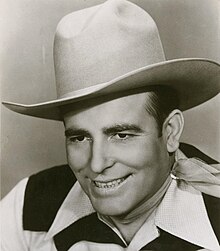Bob Wills | |
|---|---|
 Wills c. 1946 | |
| Background information | |
| Birth name | James Robert Wills |
| Also known as | "King of Western Swing" |
| Born | March 6, 1905 Kosse, Texas, U.S. |
| Died | May 13, 1975 (aged 70) Fort Worth, Texas, U.S. |
| Genres | Western swing |
| Instrument(s) | Fiddle, vocals |
| Years active | 1929‒1973 |
| Labels | Vocalion, OKeh, Columbia, MGM, Liberty |
James Robert Wills (March 6, 1905 – May 13, 1975) was an American Western swing musician, songwriter, and bandleader. Considered by music authorities as the founder of Western swing,[1][2][3] he was known widely as the King of Western Swing (although Spade Cooley self-promoted the moniker "King of Western Swing" from 1942 to 1969). He was also noted for punctuating his music with his trademark "ah-haa" calls.[4]
Wills formed several bands and played radio stations around the South and West until he formed the Texas Playboys in 1934 with Wills on fiddle, Tommy Duncan on piano and vocals, rhythm guitarist June Whalin, tenor banjoist Johnnie Lee Wills, and Kermit Whalin who played steel guitar and bass. Oklahoma guitar player Eldon Shamblin joined the band in 1937 bringing jazzy influence and arrangements. The band played regularly on Tulsa, Oklahoma, radio station KVOO and added Leon McAuliffe on steel guitar, pianist Al Stricklin, drummer Smokey Dacus, and a horn section that expanded the band's sound. Wills favored jazz-like arrangements and the band found national popularity into the 1940s with such hits as "Steel Guitar Rag", "San Antonio Rose", "Smoke on the Water", "Stars and Stripes on Iwo Jima", and "New Spanish Two Step".
Wills and the Texas Playboys recorded with several publishers and companies, including Vocalion, Okeh, Columbia, and MGM. In 1950, Wills had two top 10 hits, "Ida Red likes the Boogie" and "Faded Love", which were his last hits for a decade. Throughout the 1950s, he struggled with poor health and tenuous finances. He continued to perform frequently despite a decline in the popularity of his earlier hit songs, and the growing popularity of rock and roll. Wills had a heart attack in 1962, and a second one the next year, which forced him to disband the Texas Playboys. Wills continued to perform solo.
The Country Music Hall of Fame inducted Wills in 1968 and the Texas State Legislature honored him for his contribution to American music. In 1972, Wills accepted a citation from the American Society of Composers, Authors and Publishers in Nashville. He recorded an album with fan Merle Haggard in 1973. Wills suffered two strokes that left him partially paralyzed, and unable to communicate. He was comatose the last two months of his life, and died in a Fort Worth nursing home in 1975.[5] The Rock and Roll Hall of Fame inducted Wills and the Texas Playboys in 1999.
- ^ Mazor, Barry (February 11, 2009). "The Tiffany Transcriptions, Back and Better". The Wall Street Journal. Archived from the original on February 7, 2015. Retrieved January 13, 2010.
- ^ Wolff, Country Music, "Big Balls in Cowtown: Western Swing from Fort Worth to Fresno", p. 29: If any single person deserves to be considered the 'father' of western swing, it must be Bob Wills."
- ^ West, "Trails and Footprints", p. 39: "Snyder [Texas] hosts the West Texas Western Swing Festival ('Come Fiddle Around in Snyder'), recognizing the regional origins of the father of western swing, Bob Wills, from Turkey (a bit more than a hundred miles due north in Hall County) ..."
- ^ Walden, Steve. "Bob Wills lives on as band returns to road "Ah-haa!' Texas Playboys coming 'round," The Oklahoman (Oklahoma City, OK), Thursday, April 7, 1983. Retrieved April 1, 2023.
- ^ "14 May 1975, Page 10 - The Galveston Daily News at Newspapers.com". Newspapers.com. Retrieved July 16, 2022.